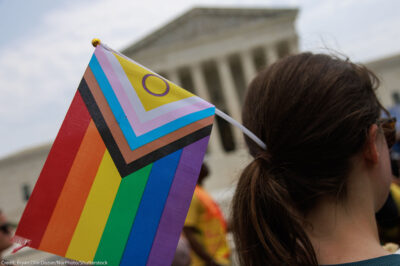known as "Don't Ask, Don't Tell." For nearly 18 years, DADT forced lesbian, gay and bisexual service members to painstakingly hide their true selves, as well as their partners and spouses, or else face the possibility of having their military career brought to an abrupt end.
Since DADT was enacted, more than 14,000 service members, committed patriots all, were fired simply on the basis of their sexual orientation. Today as DADT takes its rightful place in history's dustbin, it's worth reflecting on some of the important lessons in all of this.
First, DADT is, or was, a perfect illustration of the dangers of writing government-sanctioned discrimination into our laws. At the outset, it was considered, at least by some, as a step in the right direction towards eventually allowing open service for all service members regardless of sexual orientation. In practice, DADT relegated lesbian, gay and bisexual service members to an inferior status and was repeatedly used to end otherwise promising military careers. The good news is that with DADT's demise, there remains only one federal law that overtly discriminates against people based on their sexual orientation ÔÇô the misnamed Defense of Marriage Act (DOMA). Like DADT, DOMA too will eventually be remembered as an unfortunate, discriminatory historical footnote on the long march to equal citizenship for gay men and lesbians.
Indeed, DADT repeal and the ability of gay men and lesbians, as well as those who are bisexual, to serve their country openly and honestly will, in my opinion, be remembered by history as a critical turning point in the realization of equal citizenship. The military is one of the most revered institutions in our country, and the elimination of the military's mandated closet will only serve to speed the process of overall public acceptance of LGBT people and a continued rejection of the discriminatory policies of the past. Having visible gay and lesbian soldiers, sailors, airmen and Marines is incredibly meaningful and important, both for our country's armed forces, which will benefit from the service and sacrifice of these brave men and women, but also to a community that includes people like 89-year-old Melvin Dwork, who have waited years, indeed decades, for justice.
in 1944 and marked as "undesirable," after his boyfriend disclosed their relationship to the military. The label "undesirable" has been attached to this WWII veteran's military records for more than 60 years, simply because he was kicked out for being gay. However, in August, the Board of Corrections of Navy Records, basing its decision "in the interest of justice," changed Melvin's discharge from "undesirable" to "honorable." Thankfully, Melvin is still alive to see that justice very much delayed, was not justice denied.
As legislation last December:
There will never be a full accounting of the heroism demonstrated by gay Americans in service to this country; their service has been obscured in history. It's been lost to prejudices that have waned in our own lifetimes. But at every turn, every crossroads in our past, we know gay Americans fought just as hard, gave just as much to protect this nation and the ideals for which it stands.
There can be little doubt there were gay soldiers who fought for American independence, who consecrated the ground at Gettysburg, who manned the trenches along the Western Front, who stormed the beaches of Iwo Jima. Their names are etched into the walls of our memorials. Their headstones dot the grounds at Arlington.
Because of the freedom of gay men and lesbians, as well as those who are bisexual, to now serve their country openly and honestly, no longer will the courage and sacrifice of Americans be obscured by history. No longer will Americans like Melvin Dwork be fired from the military simply because of their sexual orientation. September 20th is a day to celebrate our country taking an important step on the often winding and hilly road of justice and equality for all. It's not the end of the road, of course more remains. However, it's an accomplishment well worth celebrating because our country is better, fairer place because of it.
Learn more about LGBT discrimination: Sign up for breaking news alerts, , and .



